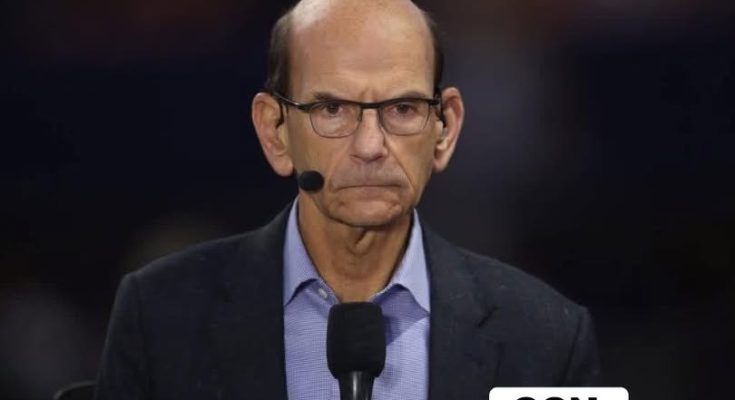Paul Finebaum was always going to sound off with the Buckeyes landing at No. 1 in the College Football Playoff rankings, and when the news dropped, the college football world braced for the familiar storm. It’s what Finebaum does best—cutting through the noise, stirring debate, and delivering that Southern blend of passion, sarcasm, and unfiltered truth that has defined his career. This time, the target was Ohio State, a team that has been both celebrated and questioned throughout the season. To Finebaum, their placement atop the rankings wasn’t just a football decision—it was a statement, and he had plenty to say about it.
When the College Football Playoff committee unveiled Ohio State at No. 1, ahead of Michigan, Georgia, and Florida State, the reaction was immediate and loud. The Buckeyes had been impressive, sure, but not dominant in every outing. Their defense was among the best in the nation, and their offense had done just enough to win key games. But in the eyes of many, Georgia was still the standard until proven otherwise. Not to Finebaum, though—not without a fight. The ESPN personality wasted no time breaking down what he saw as both a reflection of Ohio State’s résumé and the committee’s subtle message to the rest of the field: that quality wins, not just brand power, still mattered.
Finebaum’s tone, as always, carried a mix of skepticism and grudging respect. He’s been one of the most vocal critics of the Big Ten in general, often championing the SEC’s dominance and mocking northern fanbases for their self-proclaimed superiority. So when he acknowledged that Ohio State’s position was earned, it came with the weight of reluctant approval. “They’ve got the best wins,” he said on air, “and that’s what this committee values right now.” But he didn’t stop there. He quickly pivoted to a broader critique—one that turned the spotlight on Georgia, Michigan, and the playoff system itself.
To Finebaum, the rankings revealed a deeper tension within college football: the ongoing tug-of-war between perception and performance. Georgia, despite being the two-time defending national champion, was sitting outside the top spot, punished for a schedule that lacked marquee wins. Michigan, meanwhile, remained under a dark cloud of controversy as the sign-stealing investigation continued to unfold. Florida State, unbeaten but untested in his view, had earned skepticism for playing in a weakened ACC. Ohio State, on the other hand, had beaten Notre Dame on the road and handled Penn State in a physical battle. In the committee’s eyes, that combination carried weight—and Finebaum knew exactly why it mattered.
“This is a credibility move,” he argued. “The committee had to show that it values results on the field, not just reputation. Ohio State has earned that spot. But if you think it’s going to last, you haven’t watched this show long enough.” Those words carried the bite of someone who’s seen this dance before. Finebaum understands better than most that the first rankings in November are about narratives as much as they are about football. They set the tone for the weeks ahead, fueling debate and tension as the playoff picture slowly comes into focus.
Ohio State’s No. 1 spot wasn’t just about rewarding the Buckeyes—it was about challenging everyone else. It was a wake-up call for Georgia, who had coasted on dominance and pedigree. It was a message to Michigan that performance still mattered, no matter how clean their record looked. And for Finebaum, it was the perfect script. His on-air persona thrives on friction, and nothing creates more chaos than Ohio State fans celebrating while SEC supporters fume. “You can almost hear the moaning from Athens to Tuscaloosa,” he quipped, half amused, half taunting.
What Finebaum understands—and what keeps him relevant year after year—is that college football isn’t just a sport. It’s a conversation, a culture, and a constant argument about who’s best. The rankings are just the fuel. When the committee speaks, Finebaum translates it for the millions who live and breathe this game. And in this case, his interpretation was clear: the committee wasn’t crowning Ohio State as the best team in the country—it was rewarding them for surviving a schedule that few others could. “They’re No. 1 for now,” he said pointedly, “but that doesn’t make them the best team in America. It just means they’ve done the most so far.”



